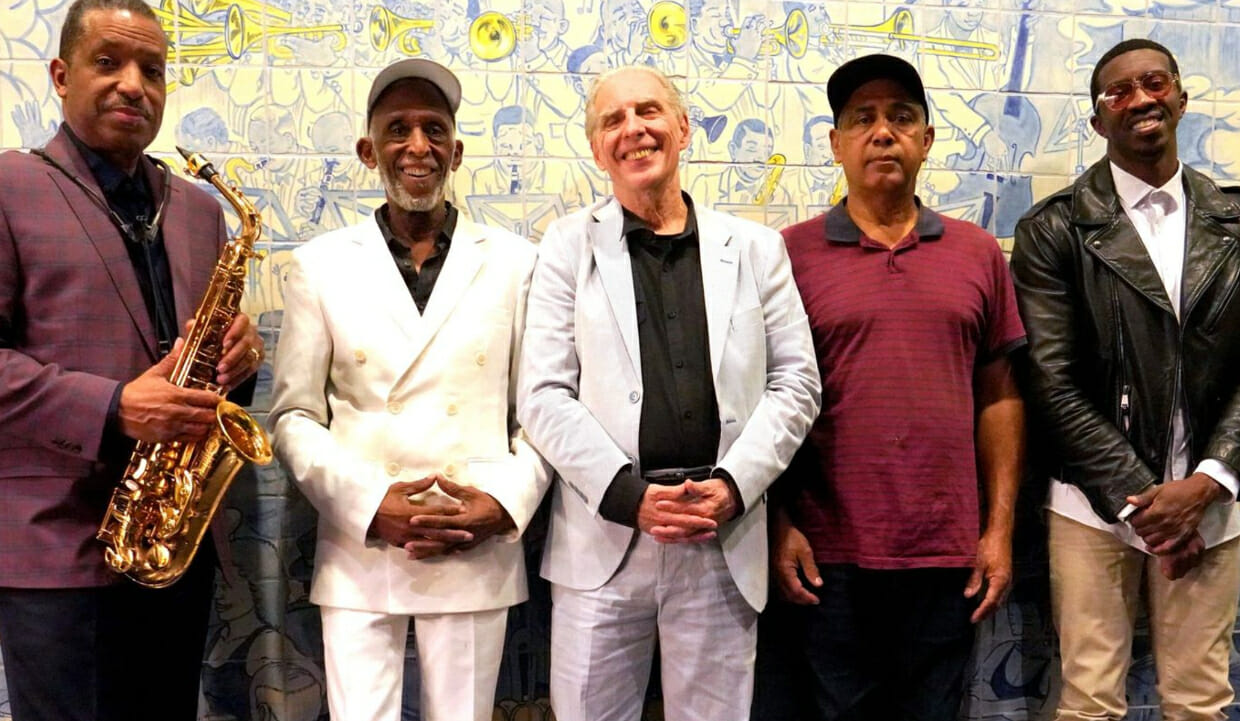Swing Time: The Headhunters

Bill Summers is filled with vivid tales from his tenure backing jazz icon Herbie Hancock. But the percussionist, and current co-bandleader of the long-running and influential Headhunters, is pretty sure he’s never told this particular one.
“There was a point where Herbie thought it necessary to sing,” he recalls, highlighting divisive, vocoder-driven LPs like 1978’s Sunlight and the following year’s Feets Don’t Fail Me Now. “He ain’t no George Benson, OK? We get to a gig at this nice place in London. One set was the shit that people knew: ‘Sly,’ ‘Chameleon,’ ‘Watermelon Man.’ The second set, Herbie would come out singing. As soon as he would start, you know what would happen? People would start throwing lettuce, tomatoes, apples, oranges, eggs, dirty socks.”
Between bursts of laughter, Summers recalls the aftermath—similarly hostile reactions in both France and Germany. “I talked to Herbie,” he says. “And not to say that I convinced him to change it, but I said, ‘Do you think there’s something wrong? Let me give you an example: Johnny Unitas goes up as the quarterback, and he sees that the defense is lined up in a pattern that he’s uncomfortable with. What does he do? He calls an audible—he changes the goddamn [play].’ This was the solution: We had to mix some of that new shit in with the old shit. But Herbie was very steadfast—I respect that about him. He didn’t bend to the wind. He stayed true to his own course.”
Summers, 74, has also followed his own path, soaking up lessons at every stop—from recording numerous albums as a bandleader (including several with his all-star outfit Los Hombres Calientes) to playing alongside legends both within the jazz realm (Eddie Henderson, Wayne Shorter) and outside of it (Quincy Jones, Sting). But he’s still most revered for his time as a Headhunter, joining Hancock for a run of revered, funky fusion classics (including 1973’s Head Hunters and 1974’s Thrust) and helping steer the band’s direction without their marquee keyboardist.
The group is now an institution, with Summers and drummer Mike Clark at the helm—and they’re aware of how, in continuing to play this music, they’re spreading its influence around.
“The jamband scene is quite interesting because a lot of them know The Headhunters,” says Summers, who highlights his admiration for guitarist Eric Krasno and saxophonist Skerik. “We were a jamband to them. I don’t know why, but they gravitate toward that music.”
And The Headhunters are continuing to experiment—as evidenced by the vibrant Speakers in the House, their first album of new songs since 2011.
But why now? “Because God said so,” Summers says with a laugh. “We didn’t have shit to do with it, to be honest with you. Michael and I have been keeping The Headhunters alive, and that’s been a task in itself.” Several years ago—he isn’t sure exactly when—the band found themselves with a rare opportunity: In exchange for playing a gig in France, they were granted access to a top[1]of-the-line studio for one week. “The facility had a kitchen— it was like an apartment complex,” he says. “People came in and cooked for us every day. It was a hell of a deal.”
Much of the project took shape during these loose, exploratory sessions, with the duo and their various collaborators crafting the bones of tracks like the swinging “Actual Proof” and the dizzying, frantically funky “Stop Watch.”
“You better be a good musician if you wanna play that motherfucker,” he says of the latter. “It’s wonderful.”
At times, they played with “no rhyme or reason,” capturing rhythmic sparks: “[I’d say,] ‘Count it off, Michael—let’s go.’”
Summers is clearly proud of Speakers in the House, which actually expands their repertoire at a time when no one would fault them for cruising. “For us, at this stage in the game, we don’t have to record another record ever,” he says. “We still do ‘Watermelon Man,’ ‘Sly,’ ‘Butterfly’—stellar tunes, memorable tunes. We’re always gonna do ‘Watermelon Man.’ We have to do that. I would have to say that particular record [Head Hunters] is iconic. Everybody played ‘Chameleon’—every marching band in the United States played that.”
But more than just one particular track or groove, he’s satisfied with his durability—and the energy this music radiates.
“I’ve been playing music all my life, since I was five years old,” Summers says. “And what’s the most important thing about being a musician? It’s not that someone likes your music. You hope they do. But what’s more important to me is longevity. Some people are [able to successfully make music] for a year. But, shit, I’m almost 75 years old! Still being involved in viable music that’s changing the planet—that’s the big reward.”




















